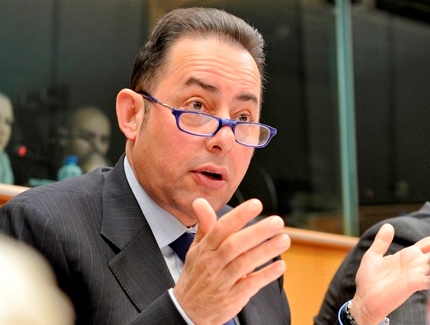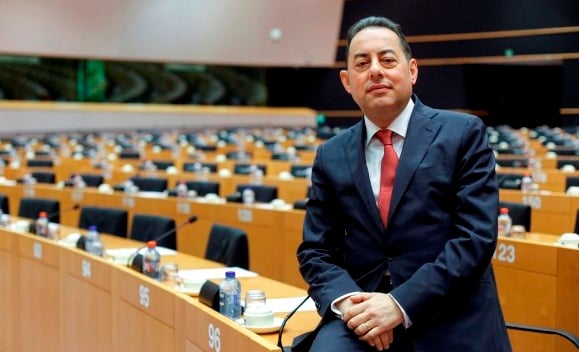Pittella Speaks to ‘Al Anbaa’: Assad Should Play No Role In The Future Of Syria
28 أكتوبر 2015

Few days before his arrival to Beirut, Gianni Pittella, President of the Group of Socialists and Democrats in the European Parliament, spoke to ‘Al Anbaa’ about his expectations from the conference to be held in Lebanon under the title: “Working together to address the refugee crisis: a progressive roadmap for EU-MENA cooperation”.
He highlighted his positions regarding developments unfolding in the Arab world, the Syrian war, the refugee crisis, and Lebanon.
1. What are your expectations regarding the upcoming conference in Beirut?
This gathering of progressive political forces is of fundamental importance. As a political family we firmly believe that the solution to this crisis and to the roots of the crisis should be based on solidarity, the defence of human rights and our shared responsibility to host and shelter refugees. Lebanon, as one of the country which has been most affected by the refugees crisis, is providing an example of humanity and responsibility to the world; playing a key role in the region which has been plagued by tensions and conflicts for many years, yet still managing to host and integrate refugees.
2. There are immense political and diplomatic discussions regarding the Syrian crisis nowadays, do you believe a political solution is imminent?
What is required, and what the S&Ds are calling for, is an international alliance of the key players; made up of the USA, Russia, the EU, Iran, Turkey and the Gulf States; fully involved in finding a solution to the crisis. A solution that could fight the global threat we face in the form of Daesh and create the conditions for a credible political transition in Syria. Assad should play no role in the future of Syria.
3. How do you see Europe will confront the migration crisis in the near future?
Europe has been silent for too long. Finally, Europe has committed to a binding mechanism to relocate refugees throughout EU member states, to improving the situation for the EU and non-EU states worst affected by this crisis and to setting up hotspots for the registration and the relocation of asylum seekers. The EU has also reinforced its efforts to return those migrants who are not entitled to international protection.
4. Lebanon hosts almost 1.5 million Syrian refugees on its territories. How can your party and Europe, in general, help support Lebanon overcome this enormous pressure?
Europe is one the major donors to Lebanon, in an effort to help alleviate the burden they face as we understand that it is very difficult for a single country to guarantee social, educational and health rights to refugees. Without a lasting peace in Palestine and Israel and a solution to the crisis in Syria, it is hard to envisage the return of refugees to their own country. The political effort invested by Europe in this regard could be crucial in speeding up both processes.
5. What are your expectations regarding the rising violence in the Arab region especially in Palestine which remains under occupation?
The occupation of Palestine is completely unacceptable. Young Palestinians, joining the new Intifada, belong to the Oslo generation who have been betrayed time and time again by empty promises. The only option is a Two State solution, with Israel and Palestine living together in peace and security along the recognised 1967 borders. We must combat both Israeli and Palestinian extremists: the real enemies of the peace process.

 عن أمل جنبلاط المتجدد: لبنان يستحق النضال
عن أمل جنبلاط المتجدد: لبنان يستحق النضال
 صحافيون أم عرّافون!
صحافيون أم عرّافون!
 ماذا يجري داخل أروقة بيت الكتائب المركزي؟
ماذا يجري داخل أروقة بيت الكتائب المركزي؟


 عن الخرائط التي تُرسم والإتفاقات التي تتساقط!
عن الخرائط التي تُرسم والإتفاقات التي تتساقط!
 “الإنحراف في الحياة”/ بقلم كمال جنبلاط
“الإنحراف في الحياة”/ بقلم كمال جنبلاط
 هاشتاغ #صار_الوقت يحل أولاً في حلقة جنبلاط
هاشتاغ #صار_الوقت يحل أولاً في حلقة جنبلاط
 طاولة نقاش عن أزمة الصحافة في جامعة AUST
طاولة نقاش عن أزمة الصحافة في جامعة AUST
 عبدالله: ليظهر لنا وزير مكافحة الفساد حرصه في صفقات البواخر والفيول
عبدالله: ليظهر لنا وزير مكافحة الفساد حرصه في صفقات البواخر والفيول
 عبدالله: غريب أمر وزارة مكافحة الفساد!
عبدالله: غريب أمر وزارة مكافحة الفساد!

 Comment to Uri Avnery: How Sad What Is Looming Ahead
Comment to Uri Avnery: How Sad What Is Looming Ahead
 “Not Enough!”
“Not Enough!”
 … لمن لم يقرأ يوسف البعيني/ بقلم وسام شيّا
… لمن لم يقرأ يوسف البعيني/ بقلم وسام شيّا
 كمال جنبلاط في مولده الأول بعد المائة: تعاليمه وأفكاره ما زالت الحلّ/بقلم عزيز المتني
كمال جنبلاط في مولده الأول بعد المائة: تعاليمه وأفكاره ما زالت الحلّ/بقلم عزيز المتني
 رئيس حزب/ وليس (… سابقاً)/ بقلم د. خليل احمد خليل
رئيس حزب/ وليس (… سابقاً)/ بقلم د. خليل احمد خليل
 التوازن السياسي في لبنان
التوازن السياسي في لبنان
 لبنان… مشاريع انقلابية مؤجلة
لبنان… مشاريع انقلابية مؤجلة
 جنبلاط وحَمَلة أختام الكاوتشوك
جنبلاط وحَمَلة أختام الكاوتشوك
 Le Liban est un symbole de tolérance
Le Liban est un symbole de tolérance
 Our Automated Future
Our Automated Future
 The True Origins of ISIS
The True Origins of ISIS
 Les Misérables vs. Macron
Les Misérables vs. Macron
 عذراً أيها المعلم/ بقلم مهج شعبان
عذراً أيها المعلم/ بقلم مهج شعبان
 رساله الى المعلم / بقلم ابو عاصم
رساله الى المعلم / بقلم ابو عاصم
 إلى روح القائد والمعلم كمال جنبلاط/ بقلم أنور الدبيسي
إلى روح القائد والمعلم كمال جنبلاط/ بقلم أنور الدبيسي
 أسرار وعناوين الصحف ليوم الجمعة 14 كانون الاول 2018
أسرار وعناوين الصحف ليوم الجمعة 14 كانون الاول 2018














